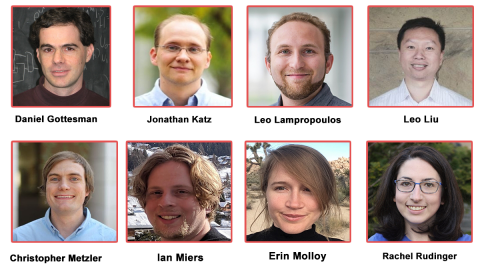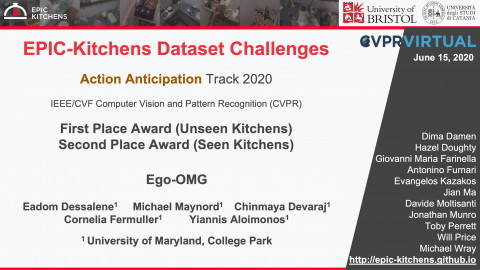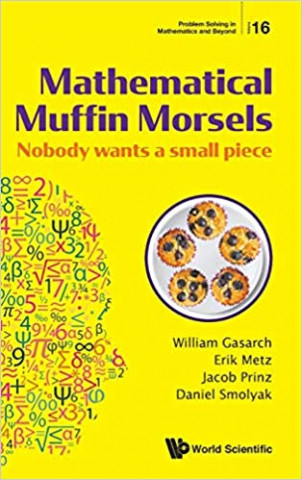Recent News & Accomplishments
2020
Distinguished University Professors Ming Lin and Hanan Samet recently received the distinguished career in computer science award by the Washington Academy of Sciences . A lifetime achievement award which acknowledges the significant impact of their work in the field of computer science. This award program started in 1940, to encourage the advancement of science and "to conduct, endow, or assist investigation in any department of science." An expert in virtual reality, Lin’s research focuses on computational robotics, haptics, physically-based modeling, virtual reality, sound rendering, and... read more
The department is pleased to announce our newest professors of computer science. This new group of professors, joining this fall, brings in research expertise ranging from cybersecurity to data visualization, from cryptography to natural language processing and more. “The department is delighted to welcome our new faculty members. They represent a tremendous amount of knowledge and expertise in critical research areas that will further strengthen the educational and research capacity of our department.” said interim chair Matthias Zwicker . Jonathan Katz Katz conducts research on cryptography... read more
Each year, the Department of Computer Science awards outstanding professors, instructors, STIC facilitators and teaching assistants for their outstanding contribution, dedication, thoughtfulness and commitment towards teaching and learning. The nominations for the award were made by the students and faculty. Assistant professor Soheil Feizi and Lecturer Mohammad Nayeem Teli served on the award committee. The award committee selected the following recipients for this year's teaching awards: Best Undergraduate Teaching Assistant : Justin De Burgo nominated for CMSC 132 Object Oriented... read more
Senior lecturer Nelson Padua-Perez was recently nominated for the Donna B. Hamilton Teaching Award for excellence in undergraduate teaching for his work in CMSC131. Each year the Office of Undergraduate Studies recognizes two faculty members campus-wide for merit in teaching. The award is based solely on student nominations and is solicited from across campus. Padua-Perez teaches CMSC131:Object-Oriented Programming I, CMSC132: Object-Oriented Programming II and CMSC216 - Introduction to Computer Systems courses. In addition to this he has also designed and taught CMSC389N: Introduction to PHP... read more
A team of PhD students advised by Professor Yiannis Aloimonos and Professor Cornelia Fermuller achieved the first and second place over the two portions of the 2020 Epic Action Anticipation Challenge . Anticipating future human activity from video is an area of great importance in computer vision with applications in human-robot interaction, surveillance, navigation, etc. To motivate research towards solving this important problem, the EPIC Kitchens Action Anticipation Challenge was launched, where 20 international teams from leading companies and universities competed. EPIC-Kitchens is the... read more
The department recently received three teaching innovation grants to develop new and creative instructional strategies for the Fall 2020 courses. The University of Maryland awarded the College of Computer, Mathematical, and Natural Sciences (CMNS) 41 Teaching Innovation Grants totaling over $477,000 to reimagine and reshape the future of teaching and learning at the university. The department received three of these grants to revise and update the courses in order to provide advanced and better learning opportunities to the students. The grant also focuses towards making the online and... read more
Professor William Gasarch recently published a book titled “Mathematical Muffin Morsels: Nobody Wants a Small Piece.” The book is co authored by Erik Metz, Jacob Prinz and Daniel Smolyak. The idea of the book sprouted when Gasarch found a pamphlet having a muffin problem proposed by Alan Frank “How can you divide and distribute 5 muffins to 3 students so that every student gets 5/3 where nobody gets a tiny sliver?” “This began as an undergraduate project, but we just kept getting more and more results in interesting ways,” said Gasarch. “A coherent story emerged that just had to be told.” The... read more
Kianté Brantley , a fourth-year doctoral student advised by Professor Hal Daumé III received the prestigious Microsoft Research Dissertation Grant for 2020 for his dissertation titled “Practical Techniques for Leveraging Experts for Sequential Decisions and Predictions.” An undergraduate and masters in computer science from University of Maryland Baltimore County, Brantley’s research focuses towards designing algorithms that efficiently integrate domain knowledge into sequential decision making problems (e.g. reinforcement learning, imitation learning and structure prediction for natural... read more
Professor Matthias Zwicker has been appointed as the interim chair of the Department of Computer Science, effective July 20, 2020. Zwicker joined UMD in March 2017 as the Reginald Allan Hahne Endowed E-Nnovate Professor in Computer Science with a joint appointment in UMIACS . His research focuses on the intersection of artificial intelligence and computer graphics to enable new applications in virtual reality, digital entertainment, multimedia, and data visualization. As chair, Zwicker will oversee a department that currently ranks 16th in the nation according to the U.S. News & World... read more
UMDCS faculty will be presenting 13 papers at ICML, 8 papers at ICLR and 2 at IJCAI for 2020
UMDCS researchers will present papers at premier, renowned global conferences focused on Machine Learning and Artificial intelligence. The International Conference on Machine Learning (ICML) (July 12 to July 18, 2020) is a globally renowned venue for presenting and publishing cutting-edge research on all aspects of machine learning used in closely related areas like artificial intelligence, statistics and data science, as well as important application areas such as machine vision, computational biology, speech recognition, and robotics. UMD researchers will present 14 papers in the main track... read more








